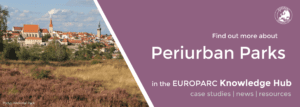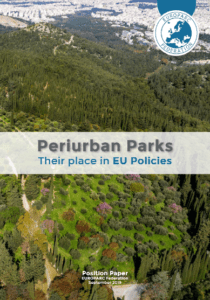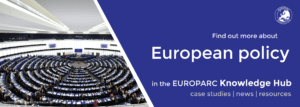How can we communicate to, with and for farmers: Workshop outcomes
© Agriculture_European Commission
EUROPARC’s Online Conference 2020 included 8 thematic workshops on diverse topics related to practice and capacity building in Protected Areas. In case you have not attended, or want to remind yourself of their outcomes, a series of articles summarises the content of some of these workshops.
From European level, to field experience
In the workshop presentations, insights from two different levels were discussed. First, Stefania Petrosillo, EUROPARC Policy Officer in Brussels, shared the relevant EU Policies that were focused on agriculture and Protected Areas. These included the Green Deal, the Farm to Fork Strategy and the Common Agriculture Policy. There is both a challenge in the increasing pressures on agriculture and an opportunity in the increasing attention for the environment.
Baptiste Hottekiet, Director of the Pays des Collines Nature Park and Representative of the Federation of Nature Parks of Wallonie-Belgium was the second presenter. He explained how Protected Areas can facilitate communication with farmers. This can lead to cooperation that is beneficial for both the Protected Areas and the farmers. For example, the farmer image towards consumers can improve substantially.
Since we accompany farmers in their work for a better sustainable and profitable agriculture, we have each year more and more farmers who participate to our nature’s projects. It’s a long-term process but it works.
The ways Pays des Collines Nature Park communicated and cooperated with farmers varied greatly. Farmers were involved in decision making processes and farmers markets with local products and educational activities were organised.
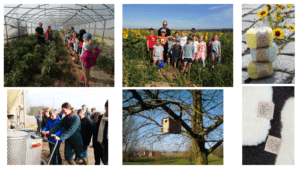
Presentation Slide – Baptiste Hottekiet
What is needed
So where do these insights leave us? In the presentations and discussions, it was evident that communication is key, both with farmers and at an EU level. By using the language of Farmers and understanding what they need, you can start a dialogue. This eventually leads to cooperation that is beneficial to both the farmer and the Protected Area.
Therefore, knowledge on how to communicate is needed in the case of farmers and the case of EU Policy. This can be provided through the creation of ‘tools’ for farmers and the exchange of knowledge between Protected Areas on this subject.
EUROPARC Federation can serve as a forum for capacity building, inspiration and sharing of best practices. By also keeping close contact with the EU institutions, Protected Areas will also stay well-represented in agricultural policies. Read for example the Position Paper on European Protected Areas and Sustainable agriculture.
For more information, please do not hesitate to contact Stefania Petrosillo, Policy Officer at EUROPARC Federation or to download the workshop presentations below.
Download the presentations:
- Case study: How Walloon Nature Parks promote a better communication with farmers?, by Baptiste Hottekiet (Director of NP Pays des Collines, BE) – download
- Presentation: The EU new strategies: Biodiversity 2030 and Farm To Fork, by Stefania Petrosillo (EUROPARC Policy Officer) – download
More info on sustainable agriculture: go here
Grenoble as Green Capital 2022
Grenoble - made by Nicole Herrero
Last week, the Green Capital 2022 title was awarded to the city of Grenoble. This city is home to one of our Periurban Park members.
Green Capital Award
The European Green Capital and Green Leaf award winners were announced in a ceremony on the 8th of October in Lisbon, the current Green Capital. Commissioner Virginijus Sinkevicius awarded Grenoble as the Green Capital of 2022. The Green Leaf award, for cities with less than 100.000 inhabitants went to Gabrovo in Bulgaria and Lappeenranta in Finland.
The winners and finalists of the green city awards have proven to be resilient and shown that, even in the most difficult circumstances like this year’s, rapid changes are possible (Commissioner Virginijus Sinkevicius).
An expert jury looked at four different cities and twelve indicators. Grenoble was awarded the Green Capital title because it scored exceptionally high in climate mitigation and adaptation. The city was granted 350.000 euros to start a ‘green year’ full of sustainable initiatives and events. Éric Piolle, the Mayor of Grenoble stated that:
We all need to adapt our way of life and I am sure that being a European Green Capital will help us to go further.
Grenoble Alpes Metropole
Grenoble is a city surounded by nature, and home to one of our members, the periurban park Grenoble Alpes Métropole. Six open recreational areas, together forming 593 ha (195 ha are under the control of “Grenoble Alpes Métropole”) surround the city and are connected to this initiative, allowing 404.000 “city dwellers” to get in touch with nature. These areas are now preserved and reserved for recreational and educational activities such as outdoor sports and are important for the natural, historical and cultural heritage of the area. Without a doubt, these parks played a key role in the green cities’ success.
We congratulate the City of Grenoble and hope to see more of both the city and the surrounding natural areas in the following years!
2022: The Year of Greener Cities
Collserola Park, Barbara Pais.
Because of the impact of urban areas on the environment, the European Parliament has decided that 2022 will be the ‘year of Greener Cities’. This brings a lot of opportunities for, among others, Periurban Parks.
On the 17th of September, the European Parliament proposed that the year 2022 will be the ‘European Year of Greener Cities’. The aim is to make urban environments greener and to increase awareness on the benefits of green spaces in an urban environment. These not only include environmental benefits but also benefits linked to health, culture and education. The European Year of Greener Cities will also explicitly focus on topics such as green infrastructure and greener public procurement. The European Parliament has stated that Involving cities is paramount for reaching the targets of the Biodiversity Strategy for 2030.
Greening cities involves more than just implementing initiatives to make cities more verdant given the importance of clean air, water, soil and a cityscape that promotes biodiversity for ensuring the sustainability of verdant spaces.
Protected Areas are not explicitly mentioned in the proposal of the European Parliament, which is unfortunate because Periurban Parks highly contribute to the above mentioned ambitions. Therefore, it is key to convince the European Parliament of the importance of involving Periurban Parks in the specific plans that will be developed from this announcement.
The EUROPARC Federation produced a position paper on Periurban Parks and their relevance not only for nature and biodiversity but also climate mitigation, agriculture, health, culture and education. This position paper calls upon cities to be actively involved in the protection of valuable nature in their vicinity and so derive the many benefits Periurban Parks can bring. And there is more to come: On the 4th of December, we will have a webinar on Periurban Parks in which we will present a Toolkit with practical tips for Planning, Designing and Managing Periurban Parks.
The EUROPARC Federation recognizes the importance of Periurban Parks to ensure a healthy and green future for Europe. This is why we are incredibly happy that Fedenatur took the courageous decision to close their organisation and join efforts with EUROPARC three years ago. EUROPARC’s Periurban Commission carries on the legacy of Fedenatur. In this short time, our Periurban friends have complemented the work of EUROPARC, bringing new perspectives from the natural parks closest to cities.
The State of the European Union in the Protected Areas perspective
EU Commission President, Ursula von der Leyen by Arno Mikkor
In the State of the European Union address, the European Commission President Ursula von der Leyen presented the achievements and the challenges of the European Union and the plans for the coming year. How can we read this speech from the European Protected Areas perspective?
On the 16th of September, the European Commission President Ursula von der Leyen had her first SOTEU (State of the European Union) address to the European Parliament in Brussels. This important annual speech indicated the key topics and goals of the European Commission for the coming year.
A resilient environment
Referring to the extraordinary crisis of 2020, Ms von der Leyen’s vision for the next future is to move from fragility to resilience, in terms of human health, welfare, economy and sustainability. The latter being the main element of the European Green Deal, the President stressed the urgency of a transformation towards sustainability to protect “our fragile planet”. “The planet continued to get dangerously hotter” said Ursula von der Leyen. “We see it all around us: from homes evacuated due to glacier collapse on the Mont Blanc, to fires burning through Oregon, to crops destroyed in Romania by the most severe drought in decades”.
We know change is needed – and we also know it is possible. The European Green Deal is our blueprint to make that transformation.
The EU Green Deal aims to make Europe climate neutral by 2050. The President introduced a new ambitious target to reduce CO2 emissions by at least 55% before 2030. This reduction was an increase of 15% compared to the previous target. This increase is necessary, according to the European Commission, to meet the Paris agreement and UN SDG’s. The President stated that the EU impact assessment clearly shows that European economy and industry can manage this, and a large number of SME’s and some of the world’s biggest companies support this aim.
For us, the 2030 target is ambitious, achievable, and beneficial for Europe.
While the target is clear, it could be questioned which tools will be used to meet them and whether they will be met at all. Indeed, the European Parliament debate reflected the division between supporters of a strong EU commitment and who is sceptic or definitely against it.
Other important topics
Another challenge is to balance a sustainability transformation with economic growth and stability, which are also points of attention for the European Commission. “Never before has that enduring promise of protection, stability and opportunity been more important than it is today”. The recovery plan “NewGenerationEU” is based on these principles.
Another central topic in the address was health. The Covid 19 Pandemic should serve as a lesson for future health crises, and this experience shows the need of a stronger European Health Union: A union that is able to reserve more coordination and more funding for healthcare from the European level. Ms von der Leyen also underlined that a healthier and greener society go hand in hand.
But we also saw nature come back into our lives. We longed for green spaces and cleaner air for our mental health and our physical wellbeing.
In every topic that Ms von der Leyen mentioned, youth played a central part. The next generation is pushing for change in terms of a better planet, solidarity and human rights and they can teach a lot to adults and to the European Union.
The president also mentioned the digital acceleration we are now experiencing while working from home and that EU should takes the lead in this process, in terms of data, technology and infrastructure.
Other topics that Ms von der Leyen mentioned were the importance of European values and human rights, as well as the need of EU solidarity, especially, but not only, for the reception of immigrants and asylum seekers.
The long speech of Ms von der Leyen received several positive reactions. To make the ideas of the European Commissions into feasible plans, they will need support from the European Parliament and the Council of the EU. While some MEPs in the debate were critical, especially when it came to climate and sustainability, the majority declared their support. Also, the representative of the German Presidency of the Council of the EU, Michael Roth, showed broad support in his opening speech. He stressed the importance of cohesion between European institutions and having a common objective, in particular about climate change and environment.
Protected Areas perspective
From the Protected Areas perspective, we welcome the positive approach, the optimism and the commitments that permeated the speech. We would have liked to hear more about biodiversity protection and sustainable use of nature resources, as well as about marine environment and sea protection, in the framework of the EU Green Deal, nevertheless, we understand the need to touch also other topics that are crucial in the current debate in Europe. We can easily see how much all themes are connected with the Natura 2000 network and European Protected areas’ work.
Protected Areas are on the front line to look for and adopt new adaptive planning and governance tools accounting for Climate Change. In developing innovative methods, tools and services to perform climate change vulnerability assessment and develop adaptation plans, Protected Areas can indicate to other actors and territorial managers how to prevent and react to Climate change impacts.
Economic growth and nature conservation not only can, but should, be connected. The UN’s vision, assumed by the EU Green Deal, finally underlines clearly that no sustainable economic development –and a fair society- is possible without a healthy biosphere. Protected Areas are real laboratories where every day new solutions are explored for sustainable agriculture, sustainable fishery, sustainable tourism, revitalization of rural areas and creation of green jobs.
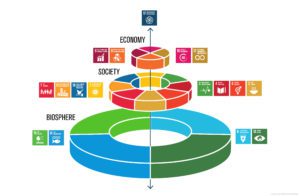
Sustainable Development Goals by Azote Images for Stockholm Resilience Centre
Human health is not possible without a healthy Planet, in terms of for example air quality and the quality of our food. Protected Areas provide what human being need in terms of mental and physical wellbeing. This is reflected well in the Healthy Parks Healthy People Europe Programme that was set up by the EUROPARC federation to support parks in this aspect.
Youth are not just our future leaders; they can provide a great support for nature conservation in protected areas today. We only have to give them a chance: EUROPARC and Protected Areas are absolutely convinced and committed to involve young generation, from the Junior Ranger program to the Aiguestortes-Declaration, from to the EUROPARC Youth Manifesto to the representative of youth in the EUROPARC Council. Moreover, next year there will be new elections for the Youth Council.
The European plans on digitalisation can open up new opportunity for remote and rural areas, and offer new tools for nature monitoring and territorial planning. Nevertheless, this process must be carefully implemented. We already see that the huge increase of social media provides important support in public awareness but also displays new challenges in Protected Areas management (as visitors’ flow management).
Last, but absolutely not least: European values and human rights. The address of Von der Leyen was referring not only to the terrible issues about rights protection of migrants, racism and discrimination against minorities, but also about democracy and right to expression. To guarantee the right of local communities to have a voice and to participate to the decisions about their own territory is an engagement for EUROPARC: The participatory approach, the dialogue with local stakeholders, the effort to build good partnership with different actors in the Protected Areas. These are all at the core of the EUROPARC programs and training.
The way forward
It is evident that Protected Areas are ready to be one of the keys players necessary to meet the sustainability targets of the EU. We can show both the public and the decision makers that investing in a transition towards a sustainable Europe is good for society, economy and the environment- “PROPELLING EUROPE FORWARD: BUILDING THE WORLD WE WANT TO LIVE IN” as the President of the European Commission encouraged in the SOTEU 2020.
